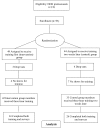The effect of training on question formulation among public health practitioners: results from a randomized controlled trial
- PMID: 18974808
- PMCID: PMC2568834
- DOI: 10.3163/1536-5050.96.4.005
The effect of training on question formulation among public health practitioners: results from a randomized controlled trial
Abstract
Objective: To improve understanding of the information-seeking behaviors of public health professionals, the authors conducted this randomized controlled trial involving sixty participants to determine whether library and informatics training, with an emphasis on PubMed searching skills, increased the frequency and sophistication of participants' practice-related questions.
Methods: The intervention group (n = 34) received evidence-based public health library and informatics training first, whereas the control group (n = 26) received identical training two weeks later. The frequency and sophistication of the questions generated by both intervention and control groups during the interim two-week period served as the basis for comparison.
Results: The intervention group reported an average of almost 1.8 times more questions than those reported by the control group (1.24 vs. 0.69 questions per participant); however, this difference did not reach statistical significance. The intervention group overall produced more sophisticated (foreground) questions than the control group (18 vs. 9); however, this difference also did not reach statistical significance.
Conclusion: The training provided in the current study seemed to prompt public health practitioners to identify and articulate questions more often. Training appears to create the necessary precondition for increased information-seeking behavior among public health professionals.
Figures



Comment in
-
Informatics training for public health practitioners.J Med Libr Assoc. 2009 Jul;97(3):162. doi: 10.3163/1536-5050.97.3.002. J Med Libr Assoc. 2009. PMID: 19626140 Free PMC article. No abstract available.
Similar articles
-
The evolution of SUMsearch for teaching clinical informatics to third-year medical students.Acad Med. 2001 May;76(5):541. doi: 10.1097/00001888-200105000-00082. Acad Med. 2001. PMID: 11346588 No abstract available.
-
Improving searching skills and evidence retrieval.J R Coll Physicians Lond. 1998 Nov-Dec;32(6):557-63. J R Coll Physicians Lond. 1998. PMID: 9881313 Free PMC article. Clinical Trial.
-
The future of Cochrane Neonatal.Early Hum Dev. 2020 Nov;150:105191. doi: 10.1016/j.earlhumdev.2020.105191. Epub 2020 Sep 12. Early Hum Dev. 2020. PMID: 33036834
-
Understanding the information needs of public health practitioners: a literature review to inform design of an interactive digital knowledge management system.J Biomed Inform. 2007 Aug;40(4):410-21. doi: 10.1016/j.jbi.2006.12.008. Epub 2007 Jan 11. J Biomed Inform. 2007. PMID: 17324632 Review.
-
Effectiveness of training health professionals in literature search skills using electronic health databases--a critical appraisal.Health Info Libr J. 2003 Mar;20(1):33-41. doi: 10.1046/j.1471-1842.2003.00416.x. Health Info Libr J. 2003. PMID: 12641528 Review.
Cited by
-
Knowledge translation strategies to improve the use of evidence in public health decision making in local government: intervention design and implementation plan.Implement Sci. 2013 Oct 9;8:121. doi: 10.1186/1748-5908-8-121. Implement Sci. 2013. PMID: 24107358 Free PMC article.
-
Current practices in library/informatics instruction in academic libraries serving medical schools in the Western United States: a three-phase action research study.BMC Med Educ. 2013 Sep 4;13:119. doi: 10.1186/1472-6920-13-119. BMC Med Educ. 2013. PMID: 24007301 Free PMC article.
-
Rural providers' access to online resources: a randomized controlled trial.J Med Libr Assoc. 2016 Jan;104(1):33-41. doi: 10.3163/1536-5050.104.1.005. J Med Libr Assoc. 2016. PMID: 26807050 Free PMC article. Clinical Trial.
-
Roles for librarians in systematic reviews: a scoping review.J Med Libr Assoc. 2018 Jan;106(1):46-56. doi: 10.5195/jmla.2018.82. Epub 2018 Jan 2. J Med Libr Assoc. 2018. PMID: 29339933 Free PMC article.
-
Response to Kelly Near and Ann Duesing's letter: "Informatics Training for Public Health Practitioners".J Med Libr Assoc. 2010 Jan;98(1):4-5. doi: 10.3163/1536-5050.98.1.002. J Med Libr Assoc. 2010. PMID: 20098643 Free PMC article. No abstract available.
References
-
- Institute of Medicine. The future of public health. Washington, DC: National Academy Press; 1988. p. 19, 32.
-
- Lasker R.D. Data needs in an era of health reform. Washington, DC: Proceedings of the 25th Public Health Conference on Records and Statistics; Jul 17–19, 1995. The quintessential role of information in public health; pp. 3–10.
-
- Friede A., Blum H.L., McDonald M. Public health informatics: how information-age technology can strengthen public health. Annu Rev Public Health. 1995;16:239–52. - PubMed
Publication types
MeSH terms
LinkOut - more resources
Full Text Sources
